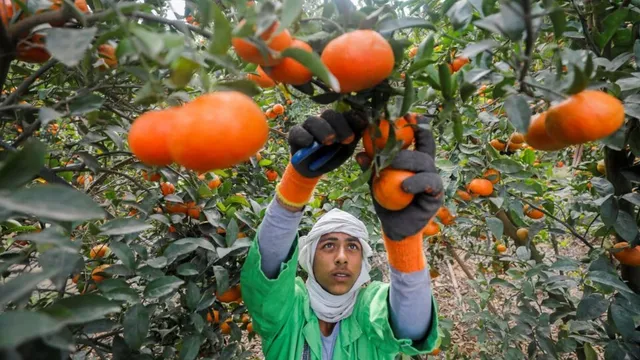- By Supratik Das
- Sat, 12 Jul 2025 09:55 AM (IST)
- Source:JND
In a powerful example of global pharmaceutical interdependence, French pharmaceutical giant Servier Pharma has switched a significant portion of its raw material procurement for its best-selling vascular medicine Daflon to India's citrus belt. Daflon, commonly used to treat varicose veins, chronic venous insufficiency, and haemorrhoids, is prepared from micronised purified flavonoid fraction (MPFF), a substance derived from oranges, particularly from oranges.
Nagpur, Himachal Oranges fuel global vascular drug
Servier, traditionally, used to import oranges from Spain and Mexico. But since FY21, the company has started looking towards India's rich orange-growing tracts, including Nagpur in Maharashtra, areas in Himachal Pradesh, Telangana, Andhra Pradesh, Madhya Pradesh, and Rajasthan. "We are proud that oranges cultivated in Indian earth are now a part of a medicine consumed by millions of people across the world," Aurelien Breton, Managing Director, Servier India, said to News18. As per IQVIA figures, Daflon's 500mg and 1000mg versions recorded a size of Rs 61 crore on moving annual turnover (MAT)in May 2025, becoming the second-biggest product in India's varicose treatment market. On average, 1.2 lakh patients are treated with Daflon monthly in India.
The process starts by the procurement of small oranges from local growers and aggregators. The oranges are then processed in India,washed, dried, and converted into powder form. The citrus powder is then exported to Servier's head office in France, where it is further processed to obtain the active pharmaceutical ingredient (API). In a remarkable instance of cyclical supply chains, said APIs are then re-exported to India, where Daflon's final formulation is produced for local distribution. "During the last year alone, we bought about 2,000 metric tons of oranges from different states of India," Breton added.
India comes Out As Reliable Sourcing And Manufacturing Center
This step reinforces India's increasing status as a consistent source for high-quality raw material and finished formulation. Indian oranges met stringent quality requirements for flavonoid extraction, enabling complete switchover from Spanish and Mexican sources, the company states. Apart from bolstering its vascular franchise, Servier is now venturing into precision oncology in India. It has introduced three new cancer treatments to meet unmet medical needs in aggressive cancers.
ALSO READ: Who Is Vaibhav Taneja? Indian-Origin Tesla CFO To Manage Musk’s America Party Funds
The first drug, Ivosidenib, it attacks isocitrate dehydrogenase 1 (IDH1) mutations in cholangiocarcinoma (biliary tract cancer) and acute myeloid leukemia (AML). "Epidemiological data indicate a high prevalence of biliary tract cancers in the Ganga River basin, stressing the need for targeted therapy," Breton said. In clinical trials, Ivosidenib has demonstrated a threefold increase in survival rate in AML patients.
ALSO READ: London Rape Case: Indian-Origin Man Gets Life Sentence For Child Assault In Southall Park
The second US FDA-approved drug, Vorasidenib, is indicated for specific primary brain tumours (gliomas) and makes patients' lives better by decreasing the frequency of seizures and postponing further therapy. "These targeted treatments leave behind the old one-size-fits-all chemotherapy strategy and represent the promise of precision medicine," Breton stated. With its growing oncology pipeline, Servier plans to address difficult and aggressive cancers by targeting the particular genetic mutations that cause each cancer subtype. The company states that this personalized treatment is poised to revolutionise cancer therapy in India.

